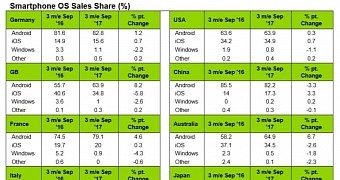Since Apple typically takes the wraps off new iPhone models in September every year, the fall is most often dominated by the Cupertino-based company, as its sales usually top those of its rivals and help increase the iOS share across the world.
But Kantar data shows that this year, the debut of the iPhone 8 has generated less enthusiasm in the mobile world, with sales clearly below the ones of the iPhone 7 a year before.
The data covering the three-month period ending September 2017 shows that iOS declined dramatically in several top markets, while Android not only that increased its share, but it did it in a way that ensured the leading position in the long term.
The United Kingdom is one good example in this regard. Sales of new iPhones in this country dropped 5.8 percent to reach 34.8 percent of all phone sales in the said period, while Android increased no less than 8.2 percent to 63.9 percent. Similar performance was recorded in Australia as well, with iOS down 2.6 percent and Android up 6.7 percent, as well as in the EU5 region where Apple declined 0.1 percent versus a 2.9 percent increase for Android.
iOS improved in several markets
There are several markets where iOS actually performed better than its rival platform. In the United States, Apple improved sales by 0.7 percent, remaining the runner-up with 34.9 percent, while Android increased only 0.3 percent to 63.9 percent.
The same thing in China where iOS posted a growth of 3.3 percent, while Android lost the exact same amount of percentage points.
Without a doubt, one of the reasons for the drop experienced by iOS in some markets is the debut of the iPhone X, as many iPhone buyers delayed the purchase to wait for the anniversary model.
“iPhone 8 and iPhone 8 Plus sales were below the level of iPhone 7 and iPhone 7 Plus sales from a year earlier. But, since the iPhone 8 is not the flagship, the comparison is somewhat meaningless. Consumers buying lower-priced and previous generation iPhones prior to the iPhone X release will have a small impact on average selling prices, but this should be more than made up for when iPhone X sales begin at starting prices of $999 and £999,” said Dominic Sunnebo, Global Business Unit Director for Kantar Worldpanel ComTech.
The iPhone X debuted on November 3, so the next round of statistics is expected to bring a major sales share increase for Apple’s mobile operating system.

 14 DAY TRIAL //
14 DAY TRIAL //